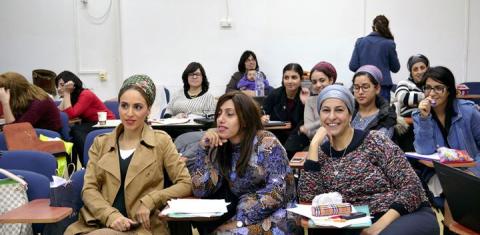Haredi Women seek secular professions
Those in attendance, members of the Forum of Seminar Principals (in Haredi parlance, “seminar” refers to high school), raised their voices frequently, and with good reason. The Haredi educators fear that the changes taking place over the past decade within the Beit Yaakov high schools have been too radical and will have fateful consequences.
These changes begin when the girls turn 15 or 16 and decide that they would prefer a different course of study, like business management with a specialty in accounting, which is the most popular major. Education Ministry statistics show that other popular courses are software engineering, fashion and product design, architecture, computers and over the past three years, electronics.
The extent of the change can be seen in figures obtained by Haaretz, that show that while in 2013 there were 11,900 Haredi girls taking technological majors, this year they number 17,300, an increase of 45 percent, a much higher increase than in the general population for those years.
When they finish 12th grade, some of them will begin to work in the fields they studied. Others will continue in their schools’ post-high school programs (grades 13-14) and complete their studies with a diploma in something other than teaching. Here are some more numbers: Only five years ago, 82 young Haredi women finished 14 years of study and were certified as technicians or practical engineers. Last year there were 460 such graduates.
A., 22, is one of the women who decided to pursue a different path. “I didn’t see myself as a teacher,” she said. “I wanted something more interesting, even though I didn’t know exactly what I wanted. I really love music, but there’s nothing much to do with that as a profession.” In the end she studied programming and accounting. “If you study computers you are almost guaranteed a livelihood,” she said.
This type of thinking is upsetting many Haredi educators. “Teaching is part of our education, part of our worldview,” a Haredi principal told Haaretz. Indeed, in their religious education, girls learn how to establish a home and maintain it and how to educate their children; it is there that their worldview is formed. But even as high schools have opened alternative courses in response to demand, there are those who fear that the entire foundation of Haredi women’s education is being undermined.
“There are high schools in which only 50 percent of the girls are studying to be teachers; it has a bad influence,” said the same Haredi principal. “If this continues, we will be cutting off the branch on which Haredi education sits. We know where the erosion starts, but we don’t know where it will end. We are liable to arrive at a situation where the girls won’t feel they need a Beit Yaakov high school.”
One of the ironies of this situation is that it isn’t taking place in a vacuum; families in which the women are the breadwinners because the husbands are expected to study Torah after marriage have to cope with the same increases in the cost of living as everyone else. Girls realize that they will need a higher income to support the desired Haredi lifestyle and are seeking professions in which their earning potential is higher; as reported here, some young women are even putting off marriage so they can finish their studies.
Not only is teaching often low paying, there is a glut of Haredi teachers, especially in the larger cities, and many women with teaching diplomas never end up finding work in the field. It is for this reason that many Haredi high schools started the alternative tracks in the first place. Yet although these programs have been flourishing for years, leading Haredi rabbis are expressing strong reservations.
“The rabbis didn’t like it then and they don’t like it now,” said the principal. “There are dilemmas and arguments. It’s not an ideal situation.”
The desire to find a place outside the confines of Haredi society expresses itself in another statistic: In 2008 only 31 percent of Haredi girls took matriculation exams, while in 2015, 51 percent did. One person welcoming this trend is Dr. Lee Kahaner, head of interdisciplinary studies at Oranim Academic College and a researcher for the Israel Democracy Institute. “They understand they need a degree to advance, and some will end up working outside the Haredi world,” she said of these girls.
Perhaps surprisingly, this deviation from “tradition” does not seem to be detrimental to the girls’ marriage prospects – on the contrary, Kahaner said. “These girls are considered good shidduchim [matches] because they earn more money and they are still Haredi in every way,” she said.
As in many other cases, the Haredi stream one belongs to can have an influence on the girls’ attitude. While many high school principals in the Lithuanian (non-Hasidic) community would prefer to turn the clock back, in the Hasidic community the attitude is different. There the girls marry very young, often before finishing their studies, and they see no reason not to have a profession in hand.
Many young women don’t see any contradiction between working in a lucrative profession and maintaining a traditional Haredi lifestyle; they actually believe it could facilitate it. “It’s precisely because I want my future husband to spend most of the day learning Torah that I need to have a good-paying job,” said S, who studied architecture. “For this I needed to pursue a professional course of study while still in high school.”
S. doesn’t deny that these courses of study are changing Haredi society from within, but only up to a point. “The core basic values of the sector – Torah study as an ideal, establishing a home, raising children – remain for me and my friends the same as ever,” she said. “The ways to achieve those same values have changed.”
Aaron Rabinowitz

